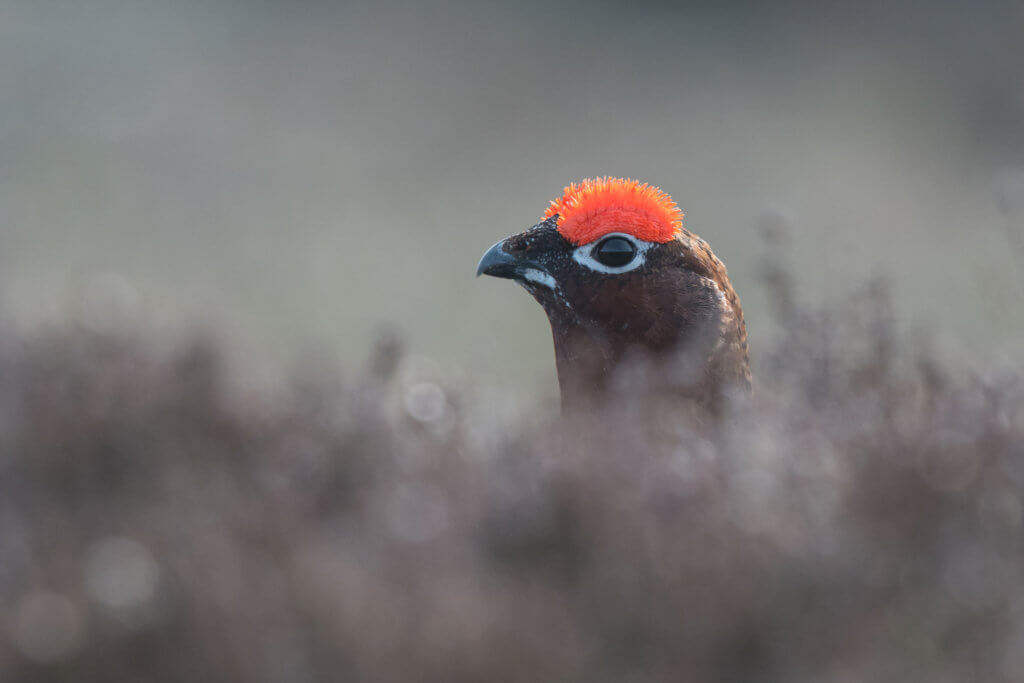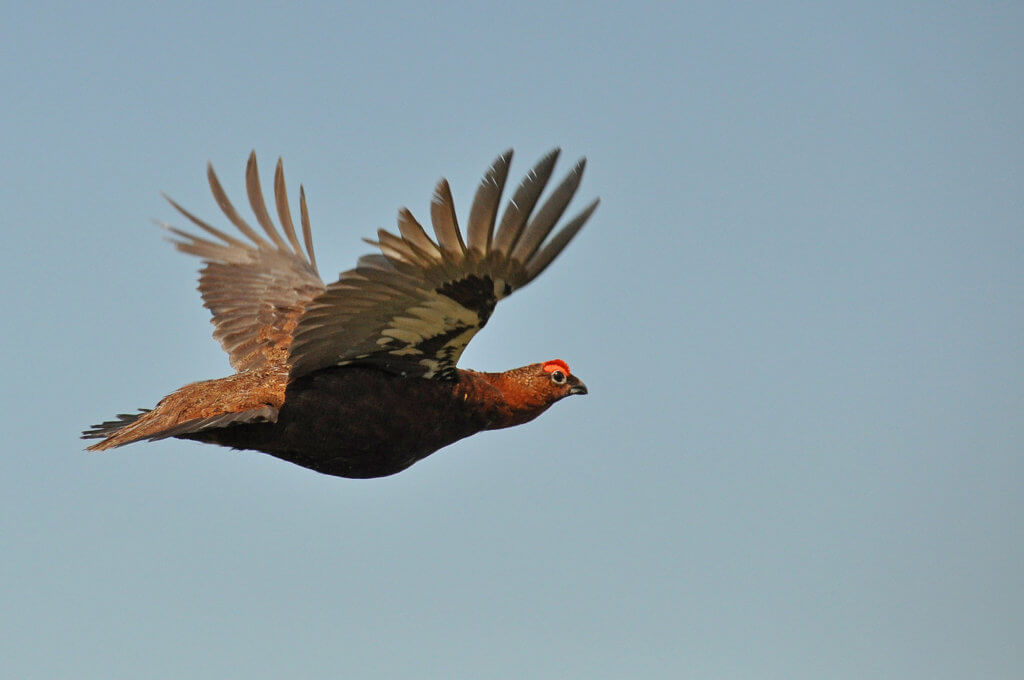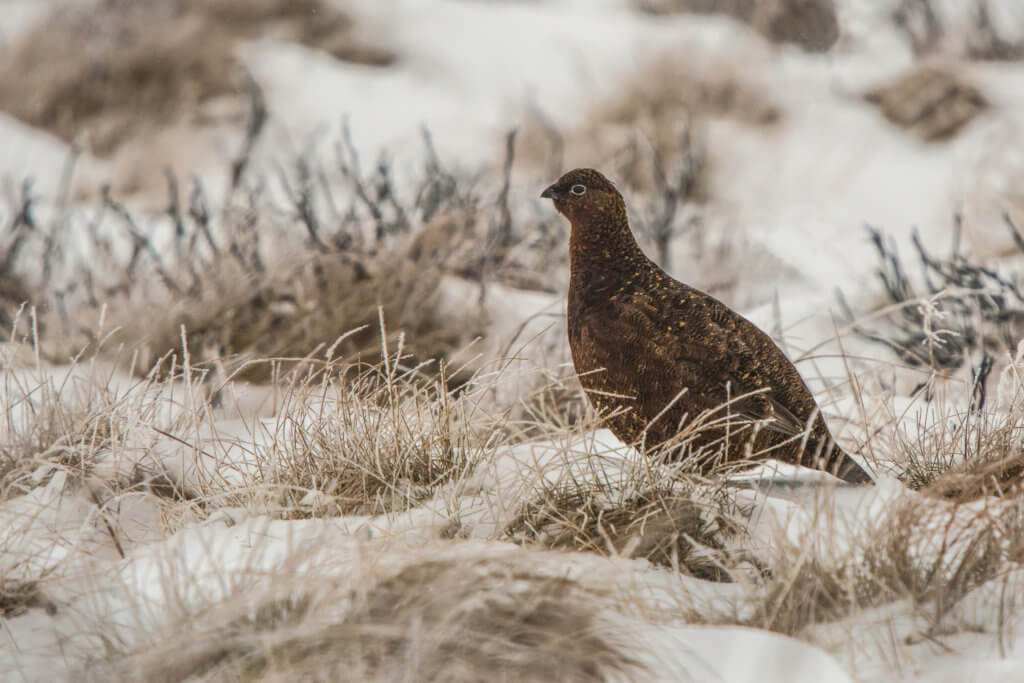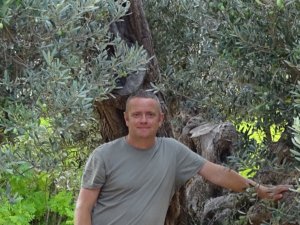
Red Grouse Photo: Tim Melling
Reclaiming the Name
One of my favourite places in Britain is the north of Dartmoor, it has a wild and rugged appeal and, more often than not, a lack of people, although this might have something to do with the artillery ranges…
Something happened up there recently, as I walked along the ridges overlooking the mires below, something that surprised me. I flushed some Red Grouse. That in itself wasn’t a surprise, Red Grouse are found on Dartmoor after all, no, the surprise was my initial reaction. As the birds went whirring away across the open moorland landscape, instead of thinking ‘brilliant’ or ‘wow, haven’t seen them recently’ my thoughts were much more disdainful. Basically, I didn’t really see the birds, I saw the ongoing wildlife disaster that is Driven Grouse Shooting (DGS).

Red Grouse Photo: Tim Melling
Thirty seconds later, with the birds long gone, I realised my mistake, I hadn’t enjoyed, nor appreciated, the view of these specialist birds as they flew, you could almost say that I had dipped on them, because, in a way, I hadn’t seen them. I’d seen the anthropogenic image instead. Dartmoor, thankfully, isn’t plagued by the blight of DGS, but when I saw those grouse, I saw burnt moorlands, I saw erosion and flooding, I saw chemically laced grit, I saw piles of dead Mountain Hares and, most vividly of all, I saw a void of Raptors. (Yes, I know that is an oxymoron.)
For me, and I suspect many others, a Red Grouse doesn’t conjure up an image of positivity, it conjures up one of negativity instead. Driven Grouse Shooting has taken a wild and beautiful bird and turned it in to an emblem of ecological carnage. We need to reclaim the Red Grouse for what it actually is, our very own endemic subspecies of the Willow Grouse, something that we all should appreciate.
It is no secret that I like Vultures, if you follow my Twitter account you will know that I often tweet and retweet about these great birds. A couple of years ago I had tweeted something about Bearded Vultures, but instead of calling them that, I had called them by their Germanic name of Lammergeiers. In response I got a tweet from a Spanish conservationist asking me to call these huge birds by their English name, rather than the German one, because the German one has not helped with its image at all in the areas of Europe where the bird had been persecuted to extinction. Lammergeier means Lamb Vulture and the main reason it became extinct is that people did believe that these scavengers did actually kill lambs. We now know this isn’t correct, but the name has stuck and it (even if it does it subconsciously) still permeates the myth. A myth which initially impeded the huge conservation effort that has gone into the bird’s recovery.
What has this got to do with those Red Grouse I saw? Well, it’s a name thing. We call them Game Birds and by doing so we permeate the myth that these birds exist to be shot. According to the Collins dictionary, the word Game in this context means “wild animals or birds that are hunted for sport”. By calling a Red Grouse a Game bird we are accepting that it is hunted for sport, we are creating an image for the bird that creates some seriously heavy baggage for it.
For the shooting industry, referring to a bird as a Game Bird makes logical sense, what doesn’t make logical sense is conservationists, naturalists and conservation organisations also doing so.
I am currently reading a book about a birder travelling around the country trying to see rare birds, he refers to Black Grouse as being Game Birds just as he refers to Red-backed Shrikes as being Passerines. I won’t name the author or the book, because to be fair to him, many, many other authors also use the term as if it is a scientific label. It isn’t.
There are many more examples, but for me, the most telling is: “The Red Grouse is a medium sized game bird…” This is the introduction to the Red Grouse on the RSPB’s website (in their otherwise very good Bird A-Z section). In effect that sentence is saying “The Red Grouse is a medium sized bird that it is totally acceptable to kill for fun.” Why not say the truth, why not say “The Red Grouse is a medium sized member of the Grouse family”? Because that is what it is. On the same site you can find this introduction to the Jackdaw, “This is a small, black crow…” not “This is a small, black pest species…” Of course they wouldn’t put that, so why put the very loaded Game Bird phrase in?
The RSPB shouldn’t be using this terminology, we shouldn’t be using this terminology, because by doing so we legitimise its meaning to the general non birding public – it’s alright to shoot them because that is what they are for. Just as calling the Bearded Vulture a Lammergeier creates an image in every German speaker’s head of birds snatching lambs from under the helpless shepherd’s gaze, by calling a bird a Game Bird we are creating an image that they are shot because that is what they are. That should be challenged, not accepted, or, dare I say it, promoted, by continuing to use this out dated term. I don’t want to single out the RSPB, because they are not alone in this, but they really ought to be looking at their use of this terminology and what it signifies to the general public.

Red Grouse Photo: Tim Melling
We have accepted the phrase Game Bird as a fact, despite the obvious connotations that its use brings with it. We need to move away from using this name and we need to reclaim these birds for what they are. Birds.

Ian Parsons spent twenty years working as a Ranger with the Forestry Commission, where he not only worked with birds of prey and dormice, but where he developed his passion for trees. Now a freelance writer, Ian runs his own specialist bird tour company leading tours to Extremadura. For more details see www.griffonholidays.com
This is Ian’s fifteenth Guest Blog here (see the Local tours for local people, 27 July 2018; Acceptability of Wildness, 16 July; Feel Good Factor, 12 July; Whitebeam Spring, 14 March 2018; How red are Reds? 18 November 2017, A Question of Importance, 13 January 2017; Disturbing Conservation, 13 December 2016; Tree Blindness, 15 September 2016; Seeing the Wood for the Trees, 9 March 2017, Love Vultures – Ban Diclofenac, 27 July 2017, Building for Wildlife, 29 August 2017; Bird of the Year, 3 January 2018; A Recycled Argument, 12 January 2018, The worst of times or the best of times?, 18 December 2018).
Ian’s book, A Tree Miscellany, was reviewed here.
[registration_form]
The problem is you can use ‘gamebird’ in two senses. It can be used to define a taxonomic group but it can also be used to mean birds that can be killed to eat. For shooters Snipe and Woodcock are ‘game’. So for your idea to work you’ll need a new word that covers grouse, partridges, pheasants etc
I would argue the taxonomic group is Galliformes, just as the Red-backed Shrike is in the Passeriformes. We call them Passerines, so we can call grouse Gallirines. I just think continuing to use the Game Bird term promotes the wrong image to the general public. We need to move away from it rather than excepting it. The latest British Birds didn’t use the name Lammergeier…
Yes, I was in the meeting when the Lammergeier decision was taken and that was solely for the reason you suggest. I understand that Galliformes is the equivalent of Passerines but the latter group is so large that people tend to use the family groups instead – pigeons, thrushes etc. So you still need to find an acceptable word that folk can use to mean pheasants, partridges, grouse etc. I don’t think Gallirines is going to catch on though maybe it should!
Without wanting to sound facetious… How about Grouse for Red Grouse, Black Grouse, Capers and Ptarmigan. Partridges for Red-legged Partridge, Grey Partridge and Chukar. And, Pheasants for Ring-necked Pheasant, Golden Pheasant, Reeve’s Pheasant etc etc.
And that does sound facetious I know, but it isn’t meant to be Ian.
Fine, but you still need a word to cover all of these – or people will have to say ‘grouse, partridges, pheasants etc’ every time they want to refer to the group as a whole. While we’re at it Hen Harrier could probably use a name change rather than one that currently focuses on the concerns of poultry keepers.
I’ve had a lam……bearded vulture fly over my head while carrying a bone, and will so miss using the L word when trying to make myself sound like a well traveled naturalist, which sadly I’m not really. It has an exotic ring to it, German is a beautiful language, but the meaning here obviously isn’t. Is there something about keeping sheep that makes their owners believe the rest of the animal kingdom do nothing else but want to eat them? I was reading an account a few days ago of Irish farmers who were accusing escaped mink of savaging their sheep. Then there was an acquaintance who told me her uncle blamed badgers for biting out lamb tongues.
Ian, yep I am sure we could come up with a whole host of species that could do with a name change, but this isn’t about a species name change it is about using the term Game Birds and the negative image that that conjures up in the minds of the general public. As you say, British Birds uses the name Bearded Vulture correctly and for the reasons that I stated in the blog, so we can change our usage of ‘labels’ quite easily.
As for your point about having a collective term, do we need one other than Galliformes? The only people that are going to be referring to the group are either the Game industry or us birders, ornithologists and naturalists and why can’t we use the term Galliformes? To the general non birding public, a Grey Partridge has nothing to do with a Pheasant, other than the fact that both are shot for fun. The general non birding public don’t need a catch all name for the group, because they don’t need it, nor are they aware of the taxonomy of the species. But they are aware that the term Game Bird means it is shot for fun, by us using that term it can be seen by the non birding general public as a form of acceptance. Surely we don’t want that?
If British Birds did a taxonomic review of Red Grouse/Willow Grouse what term should they use, Game Birds or Galliformes?
I have had to post this reply here as I think Mark’s website has got fed up with us!
What should we call the group instead? Are they a taxonomic group?
Same reason I object to calling the non-human world the ‘environment’. Reinforces the attitude that the world is just ‘us,-and-the stuff-that-surrounds-us’. Rather than accepting that other creatures have a right to their own existence, and don’t have to give us something in return.
I have Red Grouse around my house. Never do I think they are game birds. They are Red Grouse or should I say ‘Willow’ Grouse if the yanks could get away with changing the name. Yes and Robin is a Robin. To hell with adding bits like European. [oh no, he is going off on Brexit again] No I feel names are names and the more you change them the less people will get into nature. What will you change Red Grouse to Ian? The Red wattled Grouse. Oh no Black Grouse have that as well. Surely you are not thinking of getting rid of Grouse all together? Get rid of Red and call it European? Oh no here we go again! I know the ‘get back’ bird after its call. Surely if we can have Cuckoo we can have the Get back Bird. Problem solved.
John, I think you have completely misunderstood the premise of my blog. I am not proposing we change the Red Grouse’s name at all, I am saying that we, and especially conservation organisations, shouldn’t refer to them as Game Birds, as this, by definition, means that it is fine to shoot them for fun. I said call them, and by that I mean Red, Black, Capers and Ptarmigan, by the group name of Grouse. That is what they are rather than Game.
What a load of twats on here. Nobody likes humour any more. Must be Brexit.
Ooh, I do like that! I’ve often had precisely the same thought process as described in the first few paragraphs. It starts with a flash of ‘the trouble you cause’ sometimes rapidly progressing through the willfully anthropomorphic, and perhaps just a touch overly familiar, ‘daft buggers’ when delighted by the sight of their springtime antics. I agree with Ian on naming and, for the avoidance of doubt, I am not proposing ‘daft bugger’ as an alternative.
I couldn’t agree more, Ian – many thanks for putting this so well.
Totally agree! I was recently watching a programme in the ‘Great Rivers’ series, about The Nile. I forget the actual words, but the narrator referred to a family of elephants as ‘game’. I was instantly livid! Incandescent! In fact, it spoiled what was otherwise a very interesting programme. So, it seems the use of the ‘g’ word is ingrained in the public mind; hopefully, Ian, you can start a movement to wash it out of use!
Excellent. A few weeks ago I was speaking to someone who had done some beating as a young teenager, and he mentoned seeing a shot grouse and realising what a marvellous, beautiful thing it was in its own right, not simply a target for idiots to practice their shooting on. Another ludicrous issue is that because the red grouse is only found in the UK and this is the only place where driven grouse shooting takes place, then that means the reason you don’t get DGS in other countries is simply because they don’t have red grouse – according to its proponents. I have to wonder do they actually believe that themselves, or do they just hope others will swallow this crap? Probably the latter. Imagine if they tried to impose DGS in Norway, loss of woodlot forestry to heat homes, serious restrictions on their existing hunting, camping, hiking out door way of life, more flooding, far less wildlife and a greatly diminished country. Sadly most people don’t realise what we’ve missed in this country, I’m finally starting to fully do so and it’s bloody awful. The DGS lot have done their best to convert a wild bird into a semi domesticated one while pretending they’re helping our only endemic bird. Wrong on both counts, the Scottish crossbill is also an endemic, on species rather than sub species level, they tend not to like grouse moors! They drop this clanger all the time showing that their ‘wildlife’ knowledge doesn’t extend beyond a red grouse shooting range, if that.
Spot on blog. Hadn’t realised that the RSPB referred to them as game. How can they not know better? The Collins guide does not mention ‘game’ at all. In Rob Hume’s guide (RSPB) it is stated that it is shot for sport but again, the word ‘game’ is not used, so I wonder why online?
Great blog Ian. You might say the same thoughts apply to our concept of “vermin”.
A very interesting blog. The use of language is so important, and in other situations words which mean similar though different things can be used to impart a different perspective. An example being cull, kill, slaughter. All meaning slightly different things, but are often used interchangeably depending on who is talking and what their opinions are.
The example of the lammergeier is also interesting in terms of the perception of the bird. In Scots Gaelic, the hen harrier is often known as ‘clamhan nan cearc’ (essentially chicken buzzard)(the Gaelic for red grouse is cearc-fraoich which literally translates to heather chicken), but in some areas the hen harrier is called ‘clamhan nan luch’ (mouse buzzard). Would the perception of hen harriers be different if they were known as mouse harriers? I’m not sure, but the lammergeier example certainly raises the question.
Personally I think red grouse are great birds. Often your only companion on a lonely vantage point survey.
This is a great blog and I will immediately begin using the names suggested…other than when I am describing grouse as belonging to a group of birds which apparently are okay to be killed for fun.
As for lumping pheasants, partridges and grouse, I’d be happy to describe that group as grouse, partridge and pheasants – sorted!
As for Gypaetus barbatus which I have been truly lucky enough to have seen several times, and they truly are wonderful birds, I’m going to try Bartgeier.
It is the same thing that frustrates me when people write about woodcock, including scientific literature – the first sentence of the piece will always refer to it as a gamebird. I can nearly understand it in scientific literature – a scientific article refers to facts and the fact is that the woodcock is shot and is therefore a gamebird by definition. But it is also as easy to say “The woodcock is a woodland-dwelling sandpiper and is a popular quarry species for shooters across Europe”.
I believe the current level of shooting of woodcock in parts of the UK and Ireland are unsustainably high, and change must come. But to constantly refer to the bird as a gamebird when there is so much more to the woodcock than whether it gets shot or not – I think people take a species less seriously when, to the public mind, it is called a gamebird and so is simply there to be shot. That’s an impediment to their conservation.
I agree about Red and Black Grouse. For pheasant and red-legs, I propose they now be referred to as “poultry”. I think this would be a more accurate description of them and their provenance. Building upon this, the term for anyone tasked with looking after them would be “poultry keeper”.
Just looked up the entry for Galliformes on Wikipedia. One of the common names given is ‘landfowl’. This seems perfect as a neutral common name for the whole group, equivalent to waterfowl for Anseriformes. It’s also a very accessible, ‘plain English’ type of name, unlike e.g. ‘gallirines’ which sounds highly technical and obscure and doesn’t convey any information additional to the scientific name.
Unfortunately it seems to be relatively rare in common use (at the moment) – Google search for ‘landfowl’ returns 45,500 results, compared to 36,900,000 results for ‘waterfowl’. Searching for “game birds” returns 1,290,000 results.
Although ‘fowl’ often has very similar connotations to ‘game’ – think wildfowling for example. As with gamebird, it has different meanings depending on how it’s used, so it can simply refer to a taxonomic group or it can imply that the birds within that group are valuable for their meat (or eggs, in the case of domestic fowl).
Great idea Ian. There is whole set of imagery conjured up by the use of a particular word. To use the killers word is to give them an advantage.
Sorry to have arrived a little late at this party, but as far as Gypaetus barbatus is concerned ( ‘barbatus’ translates as bearded in Latin), I have always admired the old name ‘Ossifrage’, though it is hard to see how that will ever regain its place in the vocab of modern birders ( ‘Wow, what a stunning Ossifrage!!)
The gamebird debate is also interesting, I suspect it has its establishment in Victorian legalese, as there was a Ground Game Act in the 1880’s which covered both Hares and Rabbits and penalised the poor and needy for bagging them without permission.
I grew up in a shooting environment, although I grew out of it over 28 years ago, so ‘gamebirds’ has always worked for me, but these days I favour splitting them up, grouse, pheasants, partridge, waders, wildfowl.
I think the game bird tag also contributes to the antipathy most birdwatchers feel towards pheasants, barely giving them a second glance. However, to my eyes they are extraordinary birds, with complex social lives, diverse habitat exploitations, extraordinary plumage and a highly significant impact on the wider ecology. They deserve more attention and dismissing them as ‘game birds’ based on legal definitions isboth anachronistic and unhelpful.
I don’t think Gallirines will catch on too.
The best attempt I can come up with is Rest Birds. Other than male Capercaillies and the odd male pheasant I think it captures much of their nature/behaviour most of the time of these species. I also think it purposeful in its distinct contrast with Game Birds meaning. It marks the next chapter of their story. It doesn’t forget their history but it says we now nolonger consider them to be birds for shooting.
People will have to choose to continue to use Game Birds or use Rest Birds and the choice will mark their attitude to the birds. In that way it is challenging.
I also think it very gently mocks the hobby of shooting them. Doesn’t sound very challenging to shoot Rest Birds. It sounds like shooting a non living target – Oo isn’t that an idea!